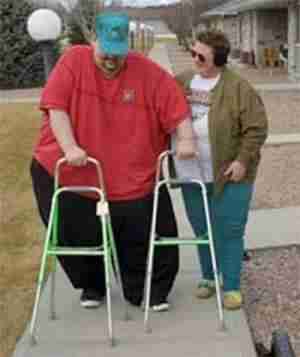
Kudos, fatsos.
Obese older adults are more likely to use walkers, canes and other mobility devices at a younger age, and may run the risk of using them incorrectly, according to new research from Purdue University.Here are some of the special devices you need.
"Baby Boomers are coming of age and obesity is an epidemic for this population as well," said Karis Pressler, a doctoral student in sociology and gerontology and the project's lead author. "This research shows that if obesity continues at this rate, we are going to see an increase in the use of assistive devices, which can be costly to individuals and the health-care system. Reliance on assistive devices can affect everyday life in multiple ways, from how you bathe, to how you dress, to how you move.
"If people don't want to be reliant on these devices in the future, they need to realize how obesity heightens one's risk of becoming disabled and affects how a person will compensate for that disability."
Other studies have evaluated the use of assistive devices, but this study is different because it follows more than 1,000 individuals, ages 65 and older, and tracks both their body weight and use of assistive devices for 10 years. The data is from a national survey about Medicare patients. The findings are published in the summer issue of The Gerontologist.
A third of adults older than 65 use at least one device, and lower body disability is what drives and predicts their use, Pressler said. The most popular devices are shower seats and tub stools, grab or handle bars for bathing, walkers, canes or a raised toilet seat.
Pay for them yourself.












No comments:
Post a Comment